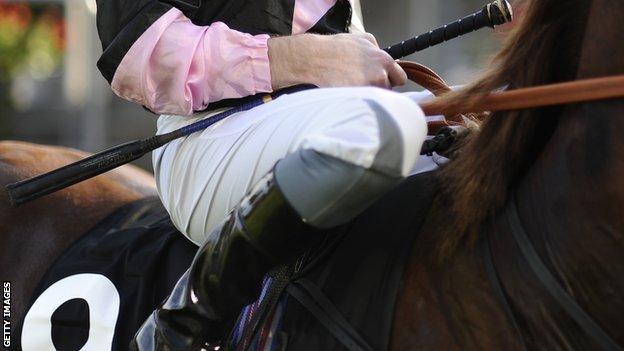Whip rule changes approved by British Horseracing Authority
- Published

Changes to controversial whip rules for jockeys and a revised penalty structure have been approved by the British Horseracing Authority (BHA).
New rules, to be introduced in time for next month's Cheltenham Festival, will mean the relaxing of restrictions on the amount of times a whip can be used.
The authority will instead concentrate on the manner and frequency of use.
A revised penalty structure has been approved after jockeys said the previous regulations were too harsh.
Rather than it being an automatic breach when a rider uses the whip eight times on the Flat and nine times over jumps, the figures become the trigger point for the stewards to review the ride in question.
Stewards will then consider how the rider has used the whip in the course of exceeding the allowed number before deciding whether a breach has occurred and a penalty is warranted.
New BHA, external chief executive Paul Bittar had indicated that he wanted the rules amended before the Festival.
"Over four months have passed since the introduction of the first set of rules following the Whip Review," said Bittar, after the changes were approved at a board meeting on Tuesday.
"Despite a number of changes to both the rule and the accompanying penalty structure, it is clear that while many objectives of the review are being met, and in particular those pertaining to horse welfare, a rule that polices the use of the whip based solely on a fixed number of strikes is fundamentally flawed.
"While well intentioned, and in accordance with initial requests from the jockeys for clarity and consistency via a fixed number, in practice the new rules have repeatedly thrown up examples of no consideration being given to the manner in which the whip is used as well as riders being awarded disproportionate penalties for the offence committed."
The whip rules have been a continuing problem since the BHA introduced strict new regulations and penalties just a few days before Flat racing's new Champions Day at Ascot last October.
French jockey Christophe Soumillon reacted with fury to receiving a ban and forfeiting over £50,000 in prize-money after being found to have hit Champion Stakes winner Cirrus Des Aigles six times in the final furlong at Ascot.
Paul Struthers, chief executive of the Professional Jockeys' Association, external welcomed the new changes.
He said in a statement: "The PJA is pleased by the decision by the British Horseracing Authority to make important amendments to both the rules and the penalties relating to the use of the whip within racing.
"This change recognises that a 'grey' issue cannot be proportionately and fairly regulated by a 'black and white' rule, and that jockeys are skilled horsemen who care passionately about horses and are being denied the ability to use their full skill and judgement throughout the course of the race.
"If this is implemented as the PJA believes is the intention, jockeys will no longer be punished for genuine, wholly unintended mistakes nor for otherwise perfectly acceptable rides."
But welfare groups expressed their concern.
David Muir, the RSPCA's equine consultant, said the changes were "a black day for the horse racing industry."
"It is absolutely staggering that the BHA has taken such a backward step, less than six months after the whip rules were introduced to react to public concern," he added.
"The real losers are the horses - jockeys are once again allowed to use the whip excessively without a relatively strong preventative punitive element."
Roly Owers, the chief executive of World Horse Welfare, external, told BBC Sport on Tuesday: "There is abundant evidence that the new whip rules are working so it is bemusing that they have been changed yet again.
"Part of this success is through having a robust penalty structure that has achieved a real behaviour change among jockeys. Hence we are concerned that the penalties have been watered down for a third time, and also whether the even greater reliance on stewards' discretion will effectively work in practice. Time will tell."
Jockeys were unhappy with the former regime and were on the verge of strike action at one stage.
"We are confident there is not a welfare problem associated with the use of the cushioned whip in British racing," said Bittar after the changes were announced.
"The objective of this proposal is to keep jockeys riding to a similar standard as they are now with regard to their significantly reduced use of the whip, but with added discretion and common sense applied by stewards when considering whether a rider is in breach of the rules."
- Published21 February 2012
- Published17 February 2012
- Published17 January 2012
- Published14 January 2012
- Published28 December 2011
- Published10 November 2011
- Published21 October 2011
- Published15 October 2011
- Published14 October 2011
- Published27 September 2011